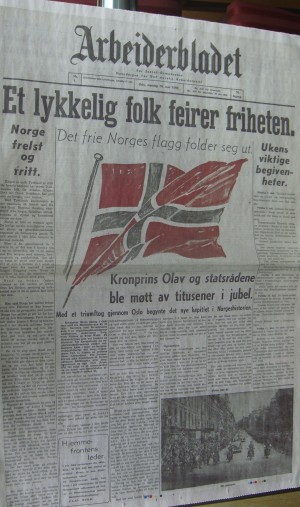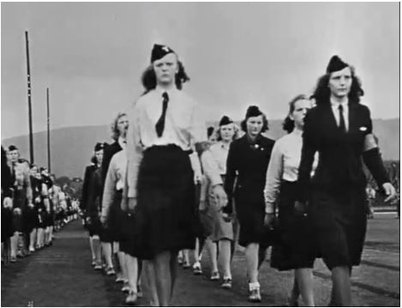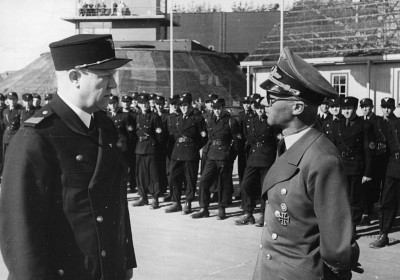The Norwegian government is now considering issuance of yet another official apology, this time to the children of Norwegians who were members of the national socialist party (Nasjonal Samling, NS) during World War II. Many of the children were bullied, sent to state-run institutions where they were treated badly and persecuted later in life.

The month of May, now full of war memorials and national holidays, was not merry for everyone when World War II ended on May 8, 1945. While the vast majority of Norwegians celebrated liberation from Nazi Germany, the trouble was just beginning for those who had landed on “the wrong side.” Norwegians who had cooperated with the occupying forces, worked for them or been members of NS were quickly put under investigation. Newspaper Dagsavisen reported recently that 17,000 Norwegians ruled as traitors were imprisoned between 1945 and 1949, and 37 were executed (25 Norwegians and 12 Germans). Of the 90,000 Norwegians under suspicion for cooperating with the enemy, around half were prosecuted. Prison terms and sentences for hard labour were relatively long, eight years or more.
The children of those prosecuted suffered badly as well. As political commentator Hege Ulstein wrote last month, “the standard rule that children always, regardless, are innocent didn’t apply to them.” They were routinely punished by Norwegians “who didn’t manage to distinguish them from the sins of the parents,” Ulstein wrote.
In a new book released on May 8, the 70th anniversary of Norway’s liberation, author Egil Ulateig presents a broader picture of the war’s end than the jubilation that’s most common. “Peace was experienced differently among the people, it wasn’t just black and white,” Ulateig told Dagsavisen.
The actual transition from war to peace went “surprisingly well,” historian Petter Ringen Johannessen told newspaper Aftenposten, despite the presence of at least 350,000 German soldiers, officers and other leaders in the country. Much of that was credited to “the Germans’ disciplined behaviour,” Johannessen said. Several Gestapo members tried to hide by donning normal German uniforms, but most were flushed out. Others turned over their weapons and within a year, most all had left Norway.

A lust for revenge, and lack of discipline, made things much harder for the suspected Norwegian traitors and their children. Ulateig accounts for how female suspects endured having their hair cut off, being harassed or even stripped naked on the streets while spectators watched and smiled. Arrests of men suspected of being on “the wrong side” were “unnecessarily brutal,” according to Ulateig. “One can understand the hate and desire for revenge against those who tortured Norwegians or committed war crimes, but the treatment of ordinary citizens is not a proud chapter in Norwegian history,” Ulateig said.
With their parents in court or prison, the children of NS members (called NS-barna in Norway) also fell victim to those seeking revenge or blaming them for their parents’ deeds. Calls are now going out for Norway’s post-war history to clearly include the darker side of freedom and liberation, especially what Member of Parliament Bård Vegar Solhjell called the “bullying, harassment and isolation” of NS children.
“It was briefly mentioned during the 50th anniversary celebrations, but the children have never received any formal apology,” Solhjell, of the Socialist Left party, told Aftenposten on Tuesday. “We know there were 50,000 members of Nasjonal Samling. We think they had around 100,000 children. There were also around 10,000 children born whose fathers were German soldiers. My main point is that the children shall not be blamed for their parents’ choices.”

Finn Wagle, a former bishop in the state church, has also pointed out how those children paid dearly for the acts of their parents. Resistance leaders during the war had demanded that loyal Norwegians not befriend “quislinger,” that they should be ignored in public and their children shouldn’t play with NS members’ children. That didn’t end with the war, and instead led to what Wagle called “stigmatizing and isolation.” The children were all but frozen out of Norwegian society, often violently.
Justice Minister Anders Anundsen said in Parliament Monday that there’s no doubt NS-children suffered after the war. “They were bullied, criticized and had lots of psychological ailments, but we lack enough research on this,” Anundsen said. “We will now go through this, with other ministries. An official apology (from the government) must be in response to errors made within the public sector.” It would be the latest apology made by the government for past injustices
Ole Wilhelm Klüwer, age 69, is a member of the association representing NS-children. His late parents were both Norwegian Nazis and his father served five years in prison after the war. He doesn’t want to demonize them and questions whether an apology from the government is necessary.
“I think we already received one, from the king and the parliament, on the 50th anniversary of the war’s end,” Klüwer, born just after the war ended, told Aftenposten. He would rather see more NS-children, now grown, take part in the public debate and stand up for their rights. For many the stigma has been so great that they’ve remained quiet, for 70 years.
newsinenglish.no/Nina Berglund

